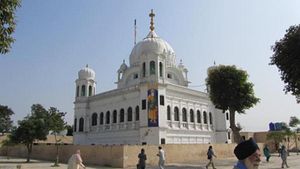Apparently, Pakistan and India are preparing for another period of relative normalcy after months of provocative posturing. The past few months have seen the two sides blaming each other for their respective failures to begin serious talks on the issue of terrorism or ceasefire violations along the Line of Control (LoC).
After coming to power more than two months ago, Imran Khan, the current prime minister of Pakistan, made it clear to the Indian leadership that he wanted better ties with New Delhi. The desire to improve ties with New Delhi has also been endorsed by Pakistan’s powerful military. In September, the current government of Pakistan offered to open talks with India on all fronts including the issue of terrorism. However, New Delhi rejected Pakistan’s proposal by saying that terror and talks cannot go to gather. Moreover, India also rejected Pakistan’s suggestion to hold a SAARC summit in Islamabad.
As expected, Pakistan, in a rejoinder, informed India of the decision to open the Kartarpur corridor, with the Pakistani Foreign Ministry saying that it “will not see any forward movement if India does not hold talks with Pakistan.” Months of back-channel diplomacy on both sides toward the opening of the Kartarpur corridor seemingly hit a dead end as the government in India said that it would not reach out to Pakistan over the corridor issue.
A few months after rejecting Pakistan’s proposal to open the Kartarpur corridor, however, the government in India has now suddenly approved plans to open a visa-free corridor for Indian Sikh pilgrims to visit Gurdwara Kartarpur Sahib in Pakistan. While a groundbreaking ceremony has already taken place on the Indian side of the border, Pakistan’s Prime Minister Khan is scheduled to officially lay the foundation stone of the corridor on the Pakistani side on November 28.
The fact that India and Pakistan have agreed to open the Kartarpur corridor shows that despite the typical mood of confrontation between the countries, reconciliation is possible. It’s important to underscore that the opening of the corridor is happening at a time when both countries are engaged in bitter mutual recriminations.
However, it’s unclear whether the decision to open the Kartarpur corridor is a change in policy in New Delhi and Islamabad, beginning a new phase of cooperation or just a development aimed at appeasing respective domestic audiences. While discussions related to the opening of the Kartarpur corridor are underway, both India and Pakistan blame each other for fomenting tensions along the LoC. A few days ago, a militant attack on the Chinese consulate in Karachi was blamed on forces that Islamabad alleges are active from Afghanistan with New Delhi’s support. India for its part continues to blame Pakistan for not acting against insurgent groups that may be involved in fueling tensions in Jammu and Kashmir.
Moreover, it’s plausible that both countries are looking to gain domestically rather than using the Kartarpur corridor development as an opportunity to initiate dialogue on more pressing bilateral issues such as deep mistrust concerning New Delhi and Islamabad’s respective positions on Afghanistan and the issue of Kashmir. With the Kartarpur corridor, the ruling Bharatiya Janata Party (BJP) in India is hoping to make significant electoral gains in the coming general election, slated for May 2019.
Moreover, denying the Sikh community an opportunity to mark Guru Nanak’s 550’s birth anniversary when Pakistan is ready to open the corridor would only alienate millions of Sikhs living in India. While it may be a risky decision on the part of the BJP as security concerns are rife, the party is hoping to weaken the Indian National Congress’s foothold in the province in the upcoming general election. It’s highly unlikely that BJP would want to use this opportunity to open dialogue with Pakistan on other fronts. Rather, in the coming weeks and months, the BJP government is expected to escalate its war of words against Islamabad to appease its domestic political audience.
Pakistan for its part is not likely to change its policy on strategic issues concerning both countries bilateral relationship. Even if Pakistan shows an inclination to open dialogue with India on strategic issues, as Islamabad is believed to have been trying for the last few months, New Delhi is not expected to reciprocate, not at least till the coming general election.

































